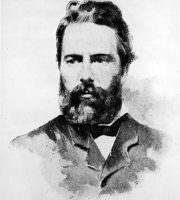by Herman Melville
'Tis travel teaches much that 's strange,
Mused Derwent in his further range;
Then fell into uneasy frame:
The visored man, relinquished name,
And touch of unglad mystery.
He rallied: I will go and see
The archimandrate in his court:
And thither straight he made resort
And met with much benignity.
The abbot's days were near the span,
A holy and right reverend man,
By name Christodulus, which means
Servant of Christ . Behind the screens
He kept, but issued the decree:
Unseen he ruled, and sightlessly:
Yes, blind he was, stone-blind and old;
But, in his silken vestment rolled,
At midday, on his Persian rug,
Showed cosy as the puss-Maltese
Demure, in rosy firelight snug,
Upon the velvet hem at ease
Of seated lady's luxuries
Of robe. For all his days, and nights,
Which eld finds wakeful, and the slights
Of churlish Time, life still could please.
And chief what made the charm to be,
Was his retention of that toy,
Dear to the old — authority.
And blent herewith was soothing balm,
Senior complacency of calm —
A settledness without alloy,
In tried belief how orthodox
And venerable; which the shocks
Of schism had stood, ere yet the state
Of Peter claimed earth's pastorate.
So far back his Greek Church did plant,
Rome's Pope he deemed but Protestant —
A Rationalist, a bigger Paine —
Heretic, worse than Arian;
He lumped him with that compound mass
Of sectaries of the West, alas!
Breathed Derwent: " This is a lone life;
Removed thou art from din and strife,
But from all news as well."
" Even so,
My son. But what 's news here below?
For hearts that do Christ's promise claim,
No hap 's important since He came.
Besides: in Saba here remain
Ten years; then back, the world regain —
Five minutes' talk with any one
Would put thee even with him, son.
Pretentious are events, but vain."
" But new books, authors of the time?"
" Books have we ever new — sublime:
The Scriptures — drama, precept fine,
Verse and philosophy divine,
All best. Believe again, O son,
God's revelation, Holy Writ,
Quite supersedes and makes unfit
All text save comment thereupon.
The Fathers have we, these discuss:
Sweet Chrysostom, Basilius,
Great Athanese, and — but all 's known
To you, no question."
In the mien
Of Derwent, as this dropped in ear,
A junior's deference was seen.
Nothing he controverted. Here
He won the old man's heart, he knew,
And readier brought to pass the thing
That he designed: which was, to view
The treasures of this hermit-king.
At hint urbane, the abbot called
An acolyth, a blue-robed boy,
So used to service, he forestalled
His lighter wishes, and took joy
In serving. Keys were given. He took
From out a coffer's deeper nook
Small shrines and reliquaries old:
Beryl and Indian seed-pearl set
In little folding-doors of gold
And ivory, of triptych form,
With starred Byzantine pictures warm,
And opening into cabinet
Where lay secured in precious zone
The honeycombed gray-greenish bone
Of storied saint. But prized supreme
Were some he dwelt upon, detained,
Felt of them lovingly in hand;
Making of such a text or theme
For grave particulars; far back
Tracing them in monastic dream:
While fondling them (in way, alack,
Of Jews his coins) with just esteem
For rich encasings. Here anew
Derwent's attention was not slack;
Yet underneath a reverence due,
Slyly he kept his pleasant state:
The dowager — her family plate.
The abbot, with a blind man's way
Of meek divining, guessed the play
Of inkept comment: " Son," said he,
" These dry bones cannot live: what then?
In times ere Christianity
By worldlings was professed, true men
And brave, which sealed their faith in blood
Or flame, the Christian brotherhood
Revered — attended them in death;
Caught the last parting of the breath:
Happy were they could they but own
Some true memento, but a bone
Purchased from executioner,
Or begged: hence relics. Trust me, son,
'Twas love began, and pious care
Prolongs this homage." Derwent bowed;
And, bland: " Have miracles been wrought
From these?" " No, none by me avowed
From knowledge personal. But then
Such things may be, for they have been."
" Have been?" " 'Tis in the Scripture taught
That contact with Elisha's bones
Restored the dead to life." " Most true,"
Eyeing the bits of skeletons
As in enlightened reverence new,
Forgetting that his host was blind,
Nor might the flattery receive.
Erelong, observing the old man
Waxed weary, and to doze began,
Strange settling sidelong, half reclined,
His blessing craved he, and took leave.
Last updated March 26, 2023




